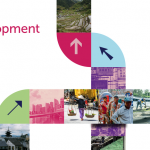Development Economics | SOAS
The MSc Development Economics is the flagship Master programme offered by the SOAS Economics Department. It combines the two core intellectual traditions nurtured for decades in our unique Department: a pluralist approach to economics and a focus on real-world development issues.
How does the programme provide content to ensure students achieve an understanding of a reasonably diverse set of perspectives on understanding economies?
In macroeconomic modules, students have the opportunity to engage with different schools of macroeconomic thought on issues like inflation, unemployment, inequality, money creation, climate change and macroeconomic policy. In microeconomic modules, different theoretical perspectives on issues like market failures, risk, market structures and production are compared and contrasted. In development economics modules, students are introduced to economic theories and policies for development through a historical, pluralist and decolonial approach. A range of optional regional modules allow students to engage with regional perspectives, based on the tradition of SOAS. In addition, gender and ecological issues are taught across both core and specialized modules.
How does the programme ensure students understand the interaction between economic and ecological systems?
Students are introduced to the tradition of ecological economics which views the economy as being embedded into the ecosystem. For example, in the compulsory module ‘Growth & Development’, students are introduced to the debates on green growth and degrowth. In the optional module ‘Advanced Macroeconomics’, mainstream and heterodox theoretical and modelling approaches to the macroeconomics of climate change are discussed. Additional optional modules, like the ‘Economics of Environment and Development’ and ‘Green Finance’ give students the opportunity to obtain a deeper understanding of the interactions between economic, financial and ecological systems. Students can also participate in the SOAS Economics Sustainability Working Group which organises reading sessions on the links between economics and ecological sustainability.
How does the programme ensure students understand how to critically explore real-world evidence, both qualitative and quantitative?
Across all modules, some taking technical and quantitative approaches and others using political economy and qualitative approaches, students are constantly exposed to the connections between theory and real-world evidence, often through the use of case studies. In ‘Econometrics’ students receive training in modern econometric methods and learn how to use these to examine quantitative empirical evidence. The optional module ‘Research Methods’ pays particular attention to qualitative methods in economics and equips students with the necessary skills for mixed methods research.
What pedagogical approaches does the programme use to ensure that students examine the historical context, assumptions and values in all economic thinking?
In the compulsory module in development economics, ‘Growth and Development’, students are introduced to the evolution of concept and policy practice in development economics through a historical approach, which starts with structuralism and dependency frameworks all the the way to Randomized Controlled Trials. In microeconomic and macroeconomic modules students participate in group discussions where they are asked to reflect on the historical context within which specific theories were developed and how this is reflected in their underlying assumptions. Most of the modules do not rely on a textbook approach. Instead, a variety of sources are used to introduce students to different perspectives to economic issues and equip them with the capacity to examine the links between different economic theories and the real world.
How does the department ensure that the teaching culture and capacity to deliver economic pluralism are continually improving?
The SOAS Department of Economics has a deep commitment to economic pluralism. The Department remains strongly committed to decolonising its curriculum and to the explicit incorporation of ecological sustainability issues into core and optional modules. It propels forward the Decolonising SOAS agenda and its Sustainability Working Group makes suggestions regarding readings to be included in SOAS modules in order to make them more aligned with the climate emergency. The Department also works closely with the Open Economics Forum, which is the SOAS student-led chapter of Rethinking Economics. Multiple feedback loops ensure that students’ suggestions regarding economic pluralism are incorporated into the modules and programmes.
Other information:
The SOAS MSc Development Economics is ideal for students who wish to obtain rigorous and pluralist training in economics with a focus on development, to cultivate a Global South perspective on real-world economic issues for a changing world, and to address intersecting inequalities and ecological challenges. The SOAS MSc in Development Economics and the critical approach to economic and development issues it provides is a gateway to various job opportunities in international organisations, governments, NGOs and private companies. The advanced nature of the programme also serves as an excellent foundation for PhD studies.
Country:
United Kingdom
University:
SOAS
Course name:
Development Economics
Department/school:
Department of Economics
Course level:
Taught Masters
Course language:
English

 all programmes
all programmes